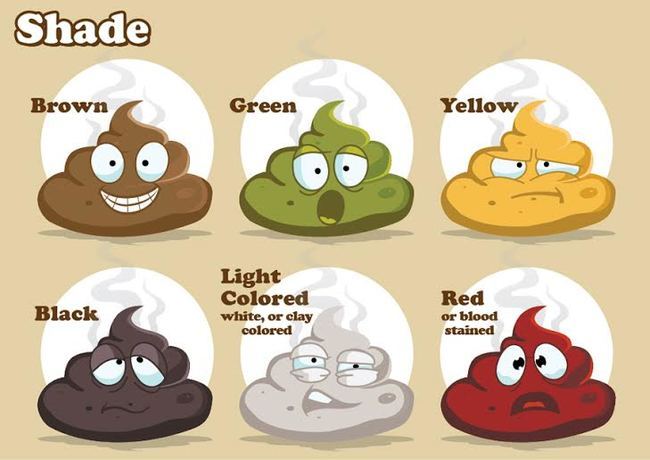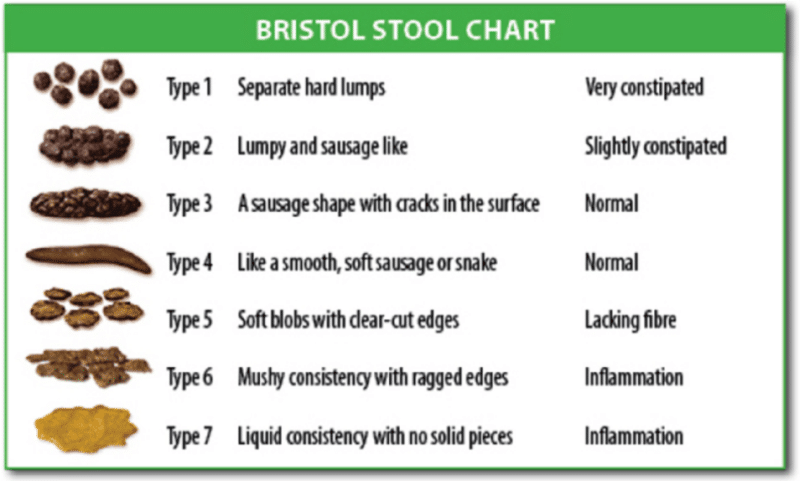Talking about poop might be a little embarrassing. In fact, I wouldn’t recommend you do it at the dinner table.
In this article
But sometimes, what happens in the bathroom can tell an important story about your health. And occasionally what happens in there can be a sign you need to talk to your doctor.
But how do you know?
Here’s the truth: At one point or another, almost everyone has wondered if what goes on in the bathroom is normal.
For instance: you might wonder, what does it mean when your poop floats? (We’ll get to that, hang on!) Or, how often is too often (or not often enough?)?
And are there any nutrition tips you should incorporate into your diet to help make pooping, well, a little more pleasant?
Ayurvedic medicine practitioners believe that healthy poop is a sign of overall health and vitality.
According to Hippocrates, the father of the modern medicine, all diseases start in the gut. Healthy gut elimination – or a good poop – is the crux of good health.
What Does it Mean When Your Poop Floats?
How your stool looks can tell a lot about the health of your gastrointestinal (GI) tract. You can tell things about the foods you eat, your GI system’s overall health, and whether you might be experiencing any abnormalities.
Here are just some of the things to look for in your poop.
1. Poop Color
You’d be surprised how much you can tell by the color of your bowel movements.
Normal stools range in color from light brown to dark brown.
Sometimes foods such as beets, licorice, and green leafy vegetables can stain the stool, causing it to be a different color.
Also, medicines such as aspirin or iron supplements can also impact its color.
The good news is: These are normal occurrences and resolve on their own.
There are many diseases and conditions, however, that can affect the color of your stool.
Hemorrhoids, bleeding anywhere in the GI tract, liver disease, irritable bowel syndrome (IBS), gallbladder disease, celiac disease, ulcerative colitis, cancers or tumors, diverticulitis, etc. are some of the conditions that may impact the color of the stool (1).

Green stool indicates waste has moved rapidly through your system, not allowing bile (an important part of the digestive process) enough time to disintegrate in the tract.
Yellow stools can indicate a gallbladder issue.
A black or tarry stool is called a melena, and is a sign that there is bleeding the GI tract. However, taking iron pills can also stain stools black.
Red or maroon-colored stools also indicates bleeding somewhere in the GI tract.
White stools can be an indicator of a pancreatic problem or a problem with absorbing fat.
Clay-colored stools are a sign of liver disease, where not enough bile is getting mixed with the intestinal content.
2. Poop Smell
There are a number of reasons for your bowel movements to smell bad.
Among them: what you ate, undigested fats or animal proteins, how long the food has being hanging out in your intestines, or any infections you might have.
Generally, though, you know what smells normal for your stool. Any sudden changes in the smell that don’t resolve themselves quickly should be evaluated.
When you notice your stools smelling worse than normal, it can indicate problems such as celiac disease, lactose intolerance, Crohn’s disease, pancreatitis, pancreatic cancer, malabsorption disorders, intestinal infection, a disturbed gut flora, cystic fibrosis, or a short bowel syndrome (2).
3. Poop Frequency
The frequency of normal bowel movements varies. Some people will go to the bathroom one to three times a day, while for others, three times a week is normal.
Frequency largely depends upon the amount of fiber you’ve eaten, how much fluids you’ve ingested, peristaltic movement (the involuntary wavelike contractions of your esophagus, stomach and intestines to move the digestive process along), and how active you’ve been.
IBS can also play a major role in the frequency of bowel movements.
When you go less often than normal, it’s called constipation, and is often accompanied by hard-to-pass stools (3).
Generally, more than three days without a bowel movement is considered worrisome, because it puts the stool at risk for becoming hardened or impacted in the intestines (4).
Poop that is loose, watery, and occurring more than four times in a day is categorized as diarrhea and can lead to dehydration and electrolyte imbalances in the body.
[Related: The Best Homemade Electrolyte Drink]
4. Floating or Sinking Poop
A normal, healthy poop should pass easily through the rectum and sink in the water because the contents are dense as compared to the water.
When your poop floats, it means there is too much gas.
That can be caused by changes in your diet or a malabsorption of fat.
5. Consistency and Length of Poop
Healthy stools resemble a ripe banana in both consistency and length.
If your bowel movements are very large, it can be a sign that the waste has been sitting too long in your bowels.
On the opposite side of things, small, hard pellets can indicate inadequate water and fiber intake.
Meanwhile, narrow or pencil-thin stools may sometimes occur and may resolve on its own. But, if thin stools are associated with other gastric symptoms like too much gas and bloating or pain in the abdomen, then it may indicate a scarred or narrowed colon.
People suffering from IBS can also have thin stools.
You may find the Bristol Stool Chart (below) helpful. It’s a medical aid used to classify the form of human poop into seven categories.

6. Gas or flatulence
Flatulence, wind, or gas is a normal occurrence and its presence is an indicator of a non-obstructed GI tract.
Normally, a male experiences flatulence 14 to 25 times a day while a female passes gas 7 to 12 times a day.
If you’re frequently passing very foul-smelling and experiencing bloating or abdominal pain, it might be worth checking with your doctor for evaluation.
How is Poop Made?
It sounds kind of icky, but the moment we start chewing our food, the process of breaking it down to form waste begins.
Saliva in your mouth starts breaking down carbohydrates for digestion. The chewed food then reaches the stomach where hydrochloric acid starts breaking down proteins.
By the time the partially digested food reaches our intestines, bile, pancreatic enzymes, and other enzymes continue to further break down the food so our bodies can absorb necessary nutrients.
As the food enters our intestines, it resembles a pulp mixed with water.
The small intestine absorbs all the necessary sugars and nutrients from the food and the large intestine absorbs the fluid from the poop.
The leftover content consists of undigested food, waste, debris, and dietary fiber that cannot be absorbed. It then moves into the colon, where it remains until a normal bowel movement occurs.
What Should You Eat for Healthy Poop?
Healthy bowel movements depend largely on what you eat and drink.
Getting enough fiber and fluids is vital for a soft, easy to move bowel movement.
According to the American Gastroenterological Association, almost 20 percent of Americans are constipated, mainly due to a poor fiber intake.
On an average, an American consumes 15 grams of fiber in a day, while 25 grams per day is the recommended amount.
The good news is that it’s easy to add fiber to your diet.
Fruits:
Most fruits are rich in fiber. Fruits should be eaten whole, along with their skin, if possible.
Fruits like pears, apples, plums, a cup of berries, etc. provide 6 to 8 grams of fiber.
Try this: Tropical Paradise: Strawberry Coconut Smoothie
Vegetables:
Vegetables are also laden with fiber and should be consumed daily for adding bulk to the bowel content.
It is recommended to eat 5 to 6 servings of fruits and vegetables daily to ensure a good bowel movement.
Sweet potato is rich in fiber and one small baked potato gives 3 grams of fiber.
Legumes and Beans:
Rich in both fiber and protein, one cup of beans provides a whopping 10 grams of fiber, which puts beans at the top of the heap when it comes to adding bulk to your diet.
Beans can be added to salads, soups, curries, pasta, or can be prepared as baked beans.
Try these: 10 Mason Jar Meals That Make Healthy Eating Easy
Pseudo Grains:
Pseudo grains – like quinoa, amaranth, and buckwheat – are rich in insoluble fiber and are excellent bulk-forming foods.
Be sure to substitute all refined flour, rice, bread, pasta and cereals with pseudo grains, not only for the fiber but also for the extra protein and nutrients.
Nuts and Seeds:
Nuts and seeds are a powerhouse of nutrients and fiber.
Among nuts, pecans, walnuts and almonds have maximum fiber content. An ounce of almond has 3.5 grams of fiber, pecans have 2.7 gm and walnuts have 1.9 gm of fiber.
Dry roasted seeds like pumpkin seeds, flaxseed, sesame seeds, etc. are packed with fiber in their husk. One ounce of pumpkin seeds gives 5 grams of fiber and one tablespoon of flaxseed delivers 2.8 grams of fiber.
Add them to salads, soups, and cereal bowls.
Dried Fruits and Prunes:
Dried fruits like figs, goji berries, raisins, apricots and prunes contain more fibre than fresh fruits and can be chewed or added to cereals, cakes, and bread and other dishes.
Fluids:
Fluids or water allows the stool to be moist and soft and makes defecation easier. So, drinking adequate amounts of clean and purified water is essential to maintain the softness of the poop.
Try these: 7 Refreshing Detox Water Recipes to Cleanse Your Body and Burn Fat
What Does Blood in Your Stool Mean?
Blood in your stool indicates rectal bleeding or active bleeding in the GI tract. The blood in the stool may be bright red, maroon or black in color.
Bleeding in the stomach will be visible as black and tarry stool, because by the time the stool is defecated the blood turns black due to the action of enzymes and the transit time.
Maroon color may be a sign of intestinal bleeding, while bright red blood may be a sign of active rectal bleeds.
Bleeding can be due to a number of conditions like ulcers, tumors or cancers, perforations, hemorrhoids, parasitic infections, or fissures.
It should be immediately evaluated by a physician.
Poop Health Can Mean Good Health
Healthy bowel movements are vital to help your body eliminate waste, debris, bacteria, and toxins effectively.
When a problem with your bowel movements occurs, it can result in a toxic build-up in the body or dehydration.
If you’re concerned about your bowel habits, it’s important to see your doctor for evaluation.
Get Back on Track
What you eat plays a huge role in healthy poop and restoring balance in your gut.
Check out my free 1-Day Detox Plan, which is designed to detoxify your body in 24 hours using healthy and tasty “cleansing” meals. Click the banner below to get it for FREE.

